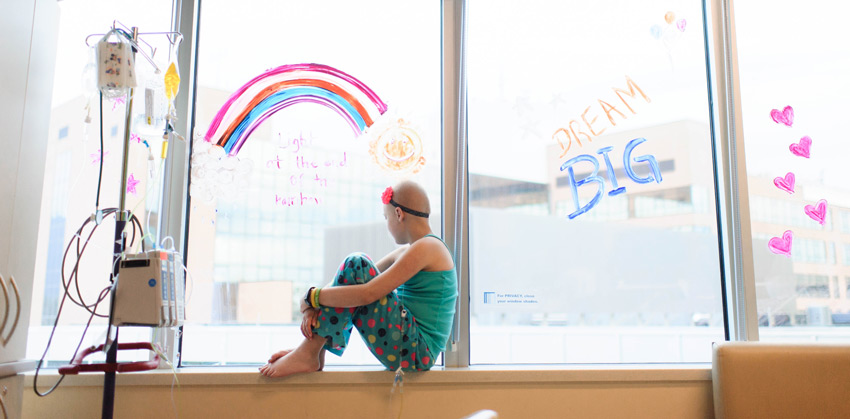Why do kids get cancer? That’s the question we asked Dr. John Maris, who co-leads the St. Baldrick’s Foundation – Stand Up to Cancer Pediatric Cancer Dream Team*. Researchers like Dr. Maris are working hard to find the answer to this question because it could hold the key to cures for kids’ cancer.

Why do kids get cancer? In short, there’s no single, easy answer.
The answer is complicated, said Dr. Maris.
What Causes Cancer?
In adults, we know that smoking cigarettes can cause lung cancer and that sun exposure can cause skin cancer. But what about in kids?
In childhood cancer, it’s not so much the environmental factors. According to Dr. Maris, it’s the genes.
But just because a parent had cancer doesn’t mean that their child will get cancer or even have a greater risk of developing childhood cancer.
“The bottom line is that genetics are very important in the cause of childhood cancer, but not in the way that it’s often thought about, where grandma had cancer, where mom had cancer, and now little Susie has cancer,” he said. “It’s not quite as simple as that.”
Learn more about the role of genes and cancer >
In fact, most kids don’t have a family history of cancer at all, he explained. Instead, childhood cancer often shows up out of the blue, when a host of genetic mutations come together in a certain way to cause cancer.
From Mutations to Cancer
Dr. Maris calls these genetic mutations “spelling mistakes.” Essentially, they are typos in the body’s genetic code.
“Some of the mutations are potent enough to cause cancer by themselves, but most require so-called ‘cooperating events,’” Dr. Maris said. “The one genetic mutation by itself is not enough, but there’s this perfect storm of two or three or maybe even dozens of other mutations or changes in the DNA that all cooperate together.”
Now, researchers are working to identify just what those DNA changes are.“That’s been complicated to unravel,” Dr. Maris said, “but we’re getting there.”
But why does unraveling any of this matter? Why is finding out what causes kids’ cancer important?
Because the key to helping kids with cancer might be found in examining that very question.
The Achilles Heel of Cancer
According to Dr. Maris, the mutations that cause kids’ cancer are often the “Achilles heel” of that cancer.
In other words, those mutations are the cancer’s weak spot. They are the chink in childhood cancer’s armor, and researchers are studying how to exploit them to help kids.
“It’s the fundamental reason why the disease occurred in the first place,” Dr. Maris explained. “And if we can learn how to take advantage of the mutation in terms of a therapy, it’s often a very effective therapy.”
But it’s not just important to find these mutations to develop therapies. It’s also important to figure out what those spelling mistakes mean, the risk attached to them, and how those mutations cause cancer in the first place.
“If you have a spelling mistake, was it 100 percent likely that you were going to develop childhood cancer or is it a 50/50 chance? Or was it just a very freak occurrence?” Dr. Maris said. “So, understanding that is required to be able to counsel patients and their families appropriately.”
The Importance of Research
Though progress has been made, so much is still unknown about why kids get cancer.
That’s why childhood cancer research is crucial. Dr. Maris wants to see not only more funding going to this quest, but also more minds and more collaboration.
That, he says, is the key to a world without childhood cancer.
“You can’t fundamentally fix a problem unless you understand it,” he said. “And if we can fix the problems, we might even be able to prevent the problems.”
Help researchers find answers to these big questions, so kids with cancer get the treatments they deserve. Fund childhood cancer research and #DFYchildhoodCancers today.
*Formerly known as the St. Baldrick’s – Stand Up to Cancer Pediatric Cancer Dream Team, this team is now the St. Baldrick’s EPICC Team (Empowering Pediatric Immunotherapies for Childhood Cancer).
Read more on the St. Baldrick’s blog:


 SBF
Tweets »
SBF
Tweets »